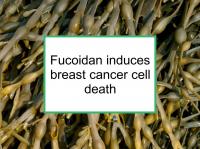A new study has reported that fucoidan inhibits breast cancer cell growth by inducing apoptosis. Fucoidan is a sulfated polysaccharide found in edible brown seaweeds such as kelp (including arame, kombu, wakame and bladderwrack), limu moui, mozuku, and hijiki. A form of fucoidan is also found in sea cucumber.
To conduct the study, the authors first prepared fucoidan extract and tested the extract in several human cancer cell lines. Fucoidan extract was found to inhibit the growth of hormone receptor positive MCF-7 and triple negative MDA-MB-231 breast cancer cells, HeLa cells (derived from cervical cancer), and HT1080 (fibrosarcoma) cells.
The authors then conducted extensive testing and evaluation of fucoidan's activity in MCF-7 breast cancer cells. Fucoidan induced apoptosis in MCF-7 cancer cells through a number of steps via a mitochondrial pathway ending with DNA fragmentation.
The authors conclude that fucoidan activates a caspase-independent apoptotic pathway in MCF-7 breast cancer cells through activation of ROS-mediated MAP kinases and regulation of the Bcl-2 family protein-mediated mitochondrial pathway. The study results provide evidence that fucoidan deserves further investigation as a natural anticancer and cancer preventive agent.
Comments regarding the study
While this most recent study suggests that fucoidan exerts its anticancer activity by inducing cell death, another study has reported that fucoidan's anticancer activity occurs as a result of interfering with the binding of epidermal growth factor to its receptor in cancer cells. And while fucoidan has been a focus of efforts to explain the apparent chemopreventive effects of various seaweeds, other explanations have also been proposed:
- Consumption of brown seaweed has been shown to favorably alter estrogen metabolism in women. Kelp extract has been shown to inhibit the binding of estradiol to estrogen receptors and progesterone to the progesterone receptor. Bladderwrack has been found to exert anti-estrogenic effects in pre-menopausal women
- Various components of brown seaweeds (including fucoidan, but also fucoxanthin, alginic acid, and laminarin) have been shown to inhibit cancer cell proliferation. However, red seaweeds, which lack these compounds, also inhibit proliferation, suggesting that other components of seaweed might also be important
- Seaweed in the Asian diet may enhance intestinal conversion of phytoestrogens, in particular the production of equol, which could explain some of the breast cancer protective effects of dietary seaweed and soybeans
- Wakame (a type of kelp) has been shown to contain eicosapentaenoic acid and stearidonic acid, omega-3 fatty acids that may favorably increase the dietary omega-3/omega-6 ratio (which in turn is thought to reduce breast cancer risk). Some other types of seaweed have been found to contain docosahexaenoic acid, another marine omega-3 fatty acid
- The relatively high iodine content of seaweed may contribute to reduction in risk of breast cancer
- The relatively high levels of calcium found in seaweed might also contribute to seaweed's chemopreventive effects in combination with other seaweed components.
We suggest consuming seaweed as food rather than taking fucoidan supplements since (1) as outlined above, various components of seaweed in addition to fucoidan may be responsible for seaweed's anticancer effects; (2) the compounds, minerals and fiber found in seaweed may act synergistically to reduce cancer risk; and (3) safe and effective levels of fucoidan have not been established. Supplementation with fucoidan might also result in increased blood thinning, depending on the formulation.
